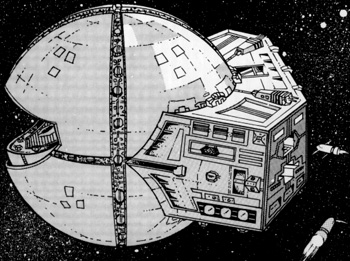Difference between revisions of "Battle Class Ship"
| Line 13: | Line 13: | ||
{| class="wikitable sortable" | {| class="wikitable sortable" | ||
| − | | | + | !colspan="6"|Ship Classification by Size {{Unpublished cite|author=Maksim-Smelchak}} |
|- | |- | ||
! # | ! # | ||
Revision as of 18:16, 10 January 2019
| Capital Ship Combatants | Escort Combatants | Military Smallcraft | Support Ships | |||||||
|---|---|---|---|---|---|---|---|---|---|---|
| Battleship | Cruiser | Carrier | Destroyer | Escort | Frigate | System Defense Boat | Fighter | Assault Transport | Smallcraft | Auxiliaries |
| Commercial Mercantile Ships | Non-Mercantile Commercial Ships | Non-Commercial Ships | Civilian Smallcraft | Highports & Satellites | ||||||
|---|---|---|---|---|---|---|---|---|---|---|
| Merchant | Liner | Transport | Commercial Industrial | Commercial Ships | General | Research | Private | Auxiliary | Orbital Complexes |
Satellites |
Battle Class Ships (BCS) are starships and spacecraft not suitable for use by groups of small groups of adventurers or operatives. [1]
- Battle Class Ships are 2,500.0 tons or larger and are created using the BCS Design System. BCS ships operate in fleets and squadrons and include some small ships only where necessary. [2]
- They require large crews, major investments of fuel and supplies, and large-scale logistics support. Only megacorporations or major polities can afford to operate such large freighters and warships. [3]
- The ships are parts of very large operations, carry enormously profitable cargos, and are parts of very large naval movements. The activities of the individuals matter little on such as scale. [4]
Description (Specifications)
Tonnages: Battle Class Ships are built using standard hulls 2500.0 tons or larger. Vessels smaller than 100.0 tons are Small Craft. Adventure Class Ships (ACS) weigh in between 100.0 tons and 2499.0 tons displacement. [5]
These vary in tonnage and in their intended function or role in fleet maneuvers and tactics. The security of the state is usually the primary design imperative. [6]
| Ship Classification by Size [7] | |||||
|---|---|---|---|---|---|
| # | Type | Tonnage | Class | Commonality | Remarks |
| 1. | Smallcraft (Subcraft) | 0 to 99 tons | Vehicle | Ubiquitous | Smallcraft are NAFAL or STL. |
| 2. | Bigcraft (Subcraft) | 100 tons or larger | Vehicle or Ship | Uncommon | Bigcraft may be designed FTL or NAFAL. |
| 3. | Adventure Class Ships (ACS) | 100 to 2,499 tons | Ship or Vessel | Common | Adventure Class ships may be FTL or NAFAL. |
| 4. | Battle Class Ships (BCS) | 2,500 to 249,999 tons | Ship or Vessel | Uncommon | Battle Class ships may be FTL or NAFAL.
|
| 5. | Fleet Class Ships (FCS) | 250,000 to 249,999,999 tons | Ship or Vessel | Rare | Fleet Class ships may be FTL or NAFAL.
|
| 6. | World Class Ships (WCS) | 2,500,000 tons or larger | Ship or Vessel | Ultra-rare | World Class ships may be FTL or NAFAL.
|
History & Background (Dossier)
Battle Class Ships are far less numerous than the smaller Adventure Class ships, and each and every one of them is a significant investment made by an interstellar player within Charted Space. Since they are always major pieces on the game board of Charted Space (…not pawns), they are always guarded, watched, accounted for, and otherwise tracked by significant entities. Their enormous roles in keeping the greater interstellar civilization alive and prosperous are vital. [8]
These vessels are typically operated on behalf of the central government. They are typically not available for private ownership. These are vessels found in planetary navies, subsector fleets, colonial and reserve fleets and sector fleets. They are typically organized into squadrons and grouped by function. [9]
References & contributors (Sources)
- Marc Miller. "Starship Design and Construction." T5 Core Rules (2013): 313, 405.
- Traveller Wiki Editorial Team
- Author & Contributor: Lord (Marquis), Captain, and Lead Naval Architect Ronald B. Kline, Jr. of the Imperial Navy
- Author & Contributor: Lord (Marquis) and Master of Sophontology Maksim-Smelchak of the Ministry of Science
- ↑ Information provided to the library by Maksim-Smelchak
- ↑ Marc Miller. T5 Core Rules (Far Future Enterprises, 2013), 405.
- ↑ Information provided to the library by Maksim-Smelchak
- ↑ Information provided to the library by Maksim-Smelchak
- ↑ Information provided to the library by Maksim-Smelchak
- ↑ Information provided to the library by Ronald B. Kline, Jr.
- ↑ Information provided to the library by Maksim-Smelchak
- ↑ Information provided to the library by Maksim-Smelchak
- ↑ Information provided to the library by Ronald B. Kline, Jr.
